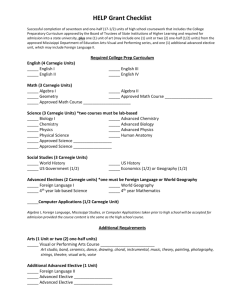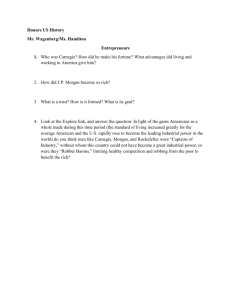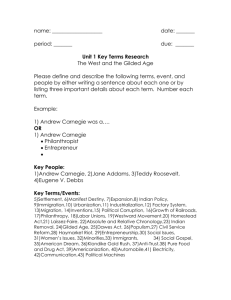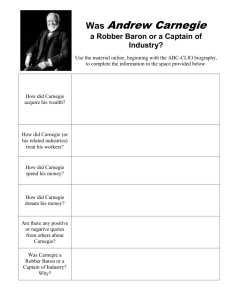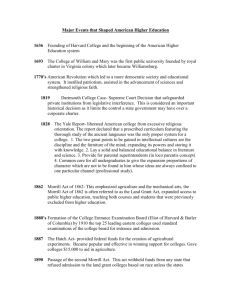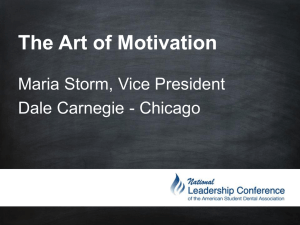parents' playbook for successful college coaching
advertisement
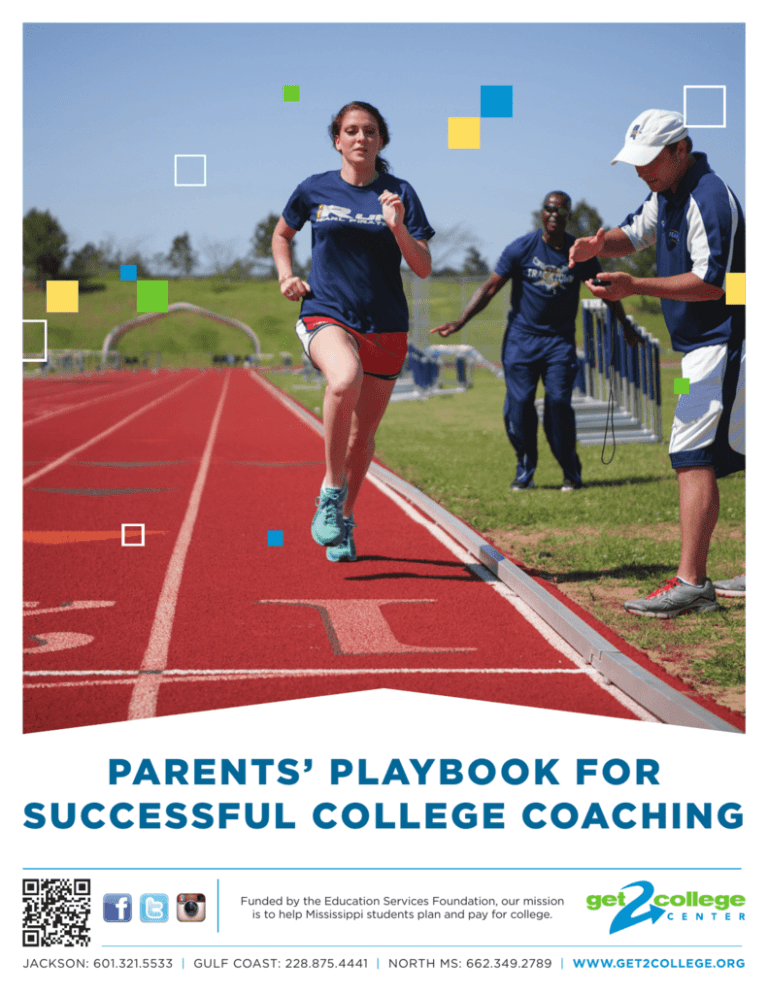
PARENTS’ PLAYBOOK FOR SUCCESSFUL COLLEGE COACHING Funded by the Education Services Foundation, our mission is to help Mississippi students plan and pay for college. JACKSON: 601.321.5533 | GULF COAST: 228.875.4441 | NORTH MS: 662.349.2789 | WWW.GET2COLLEGE.ORG MISSISSIPPI COLLEGES & UNIVERSITIES PUBLIC UNIVERSITIES Northwest MS CC Alcorn State University www.alcorn.edu Delta State University www.deltastate.edu Blue Mountain College Coahoma CC Jackson State University www.jsums.edu Mississippi State University www.msstate.edu Ole Miss Itawamba CC DSU MS Delta CC Alcorn State Co-Lin CC Southwest MS CC Blue Mountain College www.bmc.edu William Carey University www.wmcarey.edu 2 | WWW.GET2COLLEGE.ORG Jones County Junior College USM, William Carey Pearl River CC MS Gulf Coast CC Millsaps College www.millsaps.edu Tougaloo College www.tougaloo.edu Meridian CC Belhaven, Hinds CC, JSU, Millsaps, MS College, Tougaloo PRIVATE UNIVERSITIES Rust College www.rustcollege.edu East Central CC Holmes CC University of Mississippi www.olemiss.edu Mississippi College www.mc.edu MSU East MS CC Mississippi Valley State University www.mvsu.edu Belhaven University www.belhaven.edu MUW MVSU Mississippi University for Women www.muw.edu University of Southern Mississippi www.usm.edu Northeast MS CC Rust College COMMUNITY & JUNIOR COLLEGES Coahoma CC - www.coahomacc.edu Copiah-Lincoln CC - www.colin.edu East Central CC - www.eccc.edu East MS CC - www.eastms.edu Hinds CC - www.hindscc.edu Holmes CC - www.holmescc.edu Itawamba CC - www.iccms.edu Jones County JC - www.jcjc.edu Meridian CC - www.meridiancc.edu MS Delta CC - www.msdelta.edu MS Gulf Coast CC - www.mgccc.edu Northeast MS CC - www.nemcc.edu Northwest MS CC - www.northwestms.edu Pearl River CC - www.prcc.edu Southwest MS CC - www.smcc.edu THE FIVE P’S OF COLLEGE ADMISSION The “Five P’s” are widely recognized as the key elements of importance in the college admission process. They will serve as touchstones for admission and scholarship decision-makers. It is imperative that you clearly understand these criteria upon which you will be evaluated. Program: Performance: • high school profile • curriculum • classes completed compared to what is available • grades • class rank Participation: • a difference the student made in his or her school or community PROGRAM IAL PERFORMANCE POTENT Potential: • test scores - ACT, SAT, AP, IB Personality: • essays • recommendations • interviews PARTICIPATION PERSONALITY WWW.GET2COLLEGE.ORG | 3 REQUIREMENTS FOR COLLEGE ADMISSION FOUR WAYS to gain admission to a Mississippi public university 1. 2. 3. Complete the College Preparatory Curriculum (CPC) with a minimum 3.2 high school grade point average (GPA) on the CPC; or Complete the College Preparatory Curriculum (CPC) with a minimum 2.50 high school GPA on the CPC or a class rank in the top 50% and a score of 16 or higher on the ACT* (Composite); or Complete the College Preparatory Curriculum (CPC) with a minimum 2.00 high school GPA on the CPC and a score of 18 or higher on the ACT* (Composite); or 4. Satisfy the NCAA standards for student athletes who are “full-qualifiers” under Division I guidelines. *In lieu of ACT scores, students may submit equivalent SAT scores. What if I do not meet the criteria? Students who do not meet the above criteria are nonetheless eligible for admission. Such students must participate, however, in an on-campus placement process at the university of their choice. The process will determine whether the student may be enrolled in regular freshman-level courses or be required to enroll in the summer semester with mandatory participation in the Summer Developmental Program. Successful completion of the summer semester entitles the student to continued enrollment in the fall semester at the university of his or her choice. The minimum REQUIRED CPC for full admission into a Mississippi public university is as follows: The RECOMMENDED CPC for enhanced readiness for university-level coursework is as follows: • English: 4 Carnegie Units - All must require substantial • English: 4 Carnegie Units - Compensatory Reading and communication skills components (e.g., reading, writing, listening, and speaking). • Mathematics: 3 Carnegie Units - Includes Algebra I, Geometry, and Algebra II. A fourth class in higher level mathematics is highly recommended. • Science: 3 Carnegie Units - Biology, Advanced Biology, Chemistry, Advanced Chemistry, Physics, and Advanced Physics or any other science course with comparable rigor and content. One Carnegie unit from a Physical Science course with content at a level that may serve as an introduction to Physics and Chemistry may be used. Two of the courses chosen must be laboratory-based. Compensatory Writing may not be included. • Mathematics: 4 Carnegie Units - Includes Algebra I, Geometry, Algebra II, and any one Carnegie Unit of comparable rigor and content (e.g., Advanced Algebra, Trigonometry, Pre-Calculus, Calculus, AP Calculus AB, AP Calculus BC, Discrete Mathematics, Probability and Statistics, or AP Statistics). • Science: 4 Carnegie Units - Includes Biology I, Chemistry I, and any two Carnegie Units of comparable rigor and content (e.g., Physics, Physical Science, Biology II, Chemistry II, AP Chemistry, Physics II, AP Physics B, AP Physics C – Electricity and Magnetism, and AP Physics C – Mechanics, Botany, Microbiology, or Human Anatomy and Physiology). • Social Studies: 3 Carnegie Units - Courses should include United • Social Studies: 4 Carnegie Units - Includes World History, U.S. History, • Advanced Electives: 2 Carnegie Units - Requirements may be • Arts: 1 Carnegie Unit - Includes any one Carnegie Unit of visual and States History (1 unit), World History (1 unit with substantial geography component), Government (½ unit), and Economics (½ unit) or Geography (½ unit). met by earning 2 Carnegie units from the following areas/courses, one of which must be in Foreign Language or World Geography: Foreign Language, World Geography, 4th year lab-based Science, 4th year Mathematics. • Computer Applications: ½ Carnegie Unit - The course should include use of application packages such as word processing and spreadsheets. The course should also include basic computer terminology and hardware operation. • Pre-High School Units: Algebra I, first year Foreign Language, Mississippi Studies, or Computer Applications taken prior to high school will be accepted for admission provided the course content is the same as the high school course. Introduction to World Geography, U.S. Government, Economics, and Mississippi Studies. (Credit earned for a State/Local Government course in any other state may stand in lieu of Mississippi Studies.) performing arts course(s) meeting the requirements for high school graduation. • Advanced Electives: 2 Carnegie Units - Includes any two Carnegie Units of Foreign Language (I and II), Advanced World Geography and a Foreign Language (I) or any combination of English, mathematics, or lab-based science courses of comparable rigor and content to those required above. • Computer Applications: ½ Carnegie Unit - Course should emphasize the computer as a productivity tool. Instruction should include the use of application packages, such as word processing and spreadsheets. The course should also include basic computer terminology and hardware operation. • Pre-High School Units: Algebra I, first year Foreign Language, Mississippi Studies, or Computer Applications taken prior to high school will be accepted for admission provided the course content is the same as the high school course. 4 | WWW.GET2COLLEGE.ORG STUDY SKILLS: S “SCARF-M” Study Environment The location, time, and atmosphere in which students study can greatly impact their digestion and retention of the information. C Colored Pens/Highlighters Using different colored pens and highlighters while taking notes and studying can aid students in the categorization of information. A Acronyms An acronym is an abbreviation formed from the first letters in a phrase or a word. Acronyms can be used by students to remember information such as the colors of a rainbow (ROY G. BIV = Red, Orange, Yellow, Green, Blue, Indigo, Violet). R Rewrite Notes When students take notes in class, the handwriting often comes out sloppy and unorganized because they are trying to listen and write at the same time. When they get home, they should rewrite the information more legibly in an outline format that is more organized and easier to understand. F Flashcards Flashcards are an effective, inexpensive study tool that can improve students’ memorization skills. Students may also use candy, small breaks, or other rewards as incentives for reaching small goals when they memorize a certain number of flash cards. M Mnemonic Devices A mnemonic device is a formula or rhyme used as a memorization aid. Students are taught mnemonic devices in middle school to learn the Algebraic Order of Operations (Please Excuse My Dear Aunt Sally = Parentheses, Exponents, Multiplication, Division, Addition, Subtraction) or the order of notes on a musical staff (Every Good Boy Does Fine and FACE = EGBDF and FACE). Test Taking Strategies Read ALL of the directions first. If all the problems are worth the same amount of points, answer the easy questions first. Use the process of elimination (POE) on multiple choice questions. Double-check your answers. Get adequate rest the night before. Use an outline when composing an essay. WWW.GET2COLLEGE.ORG | 5 COMPARISON OF SCHOOL TYPES Middle School High School College Size 6th-8th grades 9th-12th grades 500-50,000 students Schedule 7-8 classes block scheduling, credits MWF, TTh, hours Campus halls separated by grade level halls separated by subject buildings separated by subject Class Size grouping, teams 30+ varied grade levels in subjects 50-100+ Class Options elective choices only choices within subjects unlimited options Attendance mandatory mandatory; tardies add up and can effect student exemptions voluntary and expensive Time structured structured manage your own time Student Involvement built into the school day extracurricular activities are added to the school day, before and after must decide whether to participate in co-curricular activities Parent Involvement very encouraged less encouraged but more needed not an option Parent Communication lot of teacher/parent communication and reminders students must keep track of dates and deadlines with little sharing of information directly to parents from teachers no communication with parents Parent Advocacy parent advocates for student student should speak to teachers directly when a problem/issue arises then involve parents colleges cannot discuss concerns with parents 6 | WWW.GET2COLLEGE.ORG KNOW YOUR ROLE: STUDENT = STAR PLAYER | PARENT = COACH TEACHERS, COUNSELORS, ETC. = ASSISTANT COACHES Parents often assume the role of cheerleader or casual fan in the arena of their student’s education. They celebrate winning seasons and hang their heads when their favorite player puts up disappointing stats. It is time for parents to grab the clipboard and take over as head coach in setting the pace and equipping their child with the skills needed to charge on to victory! Of course, this task is a difficult one to take on solo or even as a duo, so this is where your assistant coaches enter the game in the form of teachers, counselors, and administrators. Each of these parties holds particular skill sets to give your star player specialized training in different aspects of achievement, but the overall strategy is orchestrated by the head coach (YOU, the parent) to lead your student to success. Although it is the coach’s job to train, guide, and support, your student will ultimately be responsible for his/her own performance. So, how can parents play a bigger role to support your students and keep them on track? CHOOSING CLASSES AND ACTIVITIES: Student: Take challenging courses. Parent: Know graduation requirements and the bigger picture. Student: Read books and explore points of interest outside of class. Parent: Sign student up for extracurricular, academic, and community service programs. *We want to expose our students to challenging courses and activities but not to the point of burnout. STUDY ENVIRONMENT: CAREER EXPLORATION: Student: Research the educational requirements and average salaries of various careers. Parent: Arrange shadow opportunities for different careers and educational levels. *Parents don’t have to be an expert on all colleges, curriculums, or careers, but they can initiate the conversation. SOCIAL MEDIA ENVIRONMENT: Student: Make good choices and be aware of the information you are sharing. Parent: Encourage independence but still monitor behavior. Student: Turn off your phone. Parent: Provide healthy, quiet study environment. ORGANIZATION: Student: Write all projects, homework assignments, tests, and quizzes in a planner. Parent: Provide a yearly planner for your student to keep track of important dates. *Check behind your student and provide incentives. *Model work habits and discipline. TUTORING: Student: Get to know your teachers and take advantage of tutoring opportunities. Parent: Be proactive about making tutoring arrangements for your student before grades suffer. WWW.GET2COLLEGE.ORG | 7 COLLEGE PLANNING TIMELINE 9-11 Choose challenging high school courses. • Work with your counselor to develop a four-year plan. • The courses you take in high school show colleges what kind of goals you set for yourself. • Sign up for advanced classes, honors sections, AP or IB classes. • Choose electives that really stretch your mind and help you develop new abilities. • Research academic coursework required by colleges and universities of interest. Start building a resume. • Keep your academic records and lists of awards, honors, and activities at school and in the community. • Participate in extracurricular activities, academic programs, summer camps, and workshops. Start thinking about the colleges you want to attend. • Create a list of colleges and universities in which you are interested. • Gather information about the colleges from their websites. • Request brochures and applications. • Use www.bigfuture.collegeboard.org as a resource. Make campus visits. • Visit colleges and talk with admissions staff, sit in on classes, meet college students, and take campus tours. Prepare for standardized testing. • Prepare for the PSAT, the SAT, and/or the ACT. • Sign up to take the SAT at www.sat.org or the ACT at www.actstudent.org. • ACT recommends students take the ACT at least once their junior year, but you can begin earlier. Begin to research financial aid and scholarship sources. • If you are interested in playing sports in college, research NCAA eligibility requirements. • Explore summer opportunities and start saving for college.
